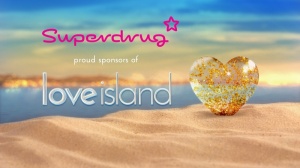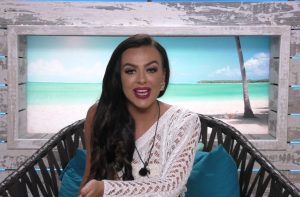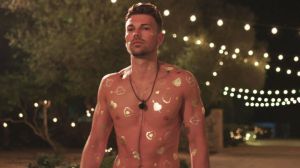Written by Tom
Following on from Week One and Week Two, here’s a series of pieces looking at the third week of Love Island, the infamous ITV2 Reality Show.
A Note on Love Island and Heteronormativity
written in relation to episodes thirteen and fourteen
 Before we get around to starting this post, we should probably take some time to discuss some of the more problematic elements of Love Island that lie at the show’s very core. While writing these posts, I’ve been very aware that the show itself is very white and very straight. I’ve never mentioned it before because it just hasn’t come up. The whole conceit of this post series has been seeing what happens if you take Love Island very seriously as a self-contained text, treating it as a drama series which works to a very idiosyncratic set of aesthetic standards. (You’ll recognise this as the technique behind my Zac Synder DC Film reviews taken one step further.) The problem with this approach is that there’s a lot of issues with Love Island which you never get around to talking about because the show itself doesn’t find them to be a problem. I can talk forever about Hayley falling through a gap in the format or Eyal being an asshole because the show is directly concerned with these things and presents them to the audience for discussion. The relative lack of diversity in Love Island is never commented on by the show itself, probably because I imagine the producers are mostly straight white people who can’t see how undiverse it is. At the very least, when it does come up, the show very quickly goes to lengths to gloss over it, which in turn leaves me with very few opportunities to critique it. The thing is, it is an actual problem.
Before we get around to starting this post, we should probably take some time to discuss some of the more problematic elements of Love Island that lie at the show’s very core. While writing these posts, I’ve been very aware that the show itself is very white and very straight. I’ve never mentioned it before because it just hasn’t come up. The whole conceit of this post series has been seeing what happens if you take Love Island very seriously as a self-contained text, treating it as a drama series which works to a very idiosyncratic set of aesthetic standards. (You’ll recognise this as the technique behind my Zac Synder DC Film reviews taken one step further.) The problem with this approach is that there’s a lot of issues with Love Island which you never get around to talking about because the show itself doesn’t find them to be a problem. I can talk forever about Hayley falling through a gap in the format or Eyal being an asshole because the show is directly concerned with these things and presents them to the audience for discussion. The relative lack of diversity in Love Island is never commented on by the show itself, probably because I imagine the producers are mostly straight white people who can’t see how undiverse it is. At the very least, when it does come up, the show very quickly goes to lengths to gloss over it, which in turn leaves me with very few opportunities to critique it. The thing is, it is an actual problem.
I decided to discuss during the Tuesday of the show’s third week when one of the sponsorship adverts showed selfies of couples who presumably watch the show, including one of a gay couple with a large love heart drawn around them. It was then that I was confronted by the absolute lack of anything alternative to the status quo in this series itself. You see, Love Island is just a deeply heteronormative show. Heteronormativity is baked into its very core: the contestants are separated into two genders and you’re only allowed to form relationships with someone of the opposite sex. And note how the one peek into any alternative happens outside of the show itself, sectioned off into the auxiliary material. It’s also an incredibly white show. Out of the 18 contestants, 3 have been non-white with there being no British Asian representation whatsoever.
As if this isn’t bad enough, there is a real sense that people who don’t conform to the status quo end up getting pushed out of the competition itself. As previously mentioned, Love Island features a very specific type of person and anyone who doesn’t conform to that type finds the competition much harder than the rest, to the point that even someone like Alex (a very attractive and highly-attentive doctor) has to battle tooth-and-claw just to even have a chance of getting to know someone. When you have this type of environment, and then realise that the only non-white woman on the island just so happens to be the only person left who’s never particularly paired with anyone yet, that’s when you start wondering how this could be viewed by a non-white/straight audience.
Hence why I want to make a bit of a fuss over this absolutely minute amount of gay representation hidden in a few seconds between actual bits of the show. When there’s so little representation of other groups, you do need to showcase what little there is while demanding more of it. Apparently there are plans for a non-heteronormative version of Love Island, an idea that has a surprising amount of potential to be interesting. Things can be better if we keep demanding it.
In terms of these posts though, do keep in mind that when I write paragraphs discussing how the show has a surprisingly liberal attitude to sex and body positivity, alongside a more nuanced representation of masculinity then you would initially think, they’re being written from a necessarily heteronormative framework by a straight white man discussing a show that’s about straight white people. And when it comes to the types of people who appear in these types of show, more alternatives should be available.
General Updates on the Contestants
written in relation to episodes fifteen and sixteen
 ALEX DID IT! HE KISSED A GIRL! USA! USA!
ALEX DID IT! HE KISSED A GIRL! USA! USA!
*ahem*
I’m not quite sure what’s happened to Love Island, but all of a sudden things have got… quite dramatic. Two new girls have joined the island. Adam immediately dumped Rosie for Zara, while Wes might be into Ellie, much to Laura’s dismay. While in previous weeks, this might have resulted in a few hushed conversations and some passive aggression, this time Wes and Laura have been stropping at each other for two days solid and Adam and Rosie are bitterly feuding.
We know my opinions on Adam. He’s manipulative scum who’s very good as making the object of his desire think they’re special to him while he himself is pretty much constantly looking for the next person to distract himself with. He’s a walking cliche, and a particularly toxic one.
Rosie is something quite special though. She has a dark, subversive glee to her, is very self-focussed, and isn’t afraid to take what she wants. In short, she’s the female equivalent of Adam. This fact made them pair very quickly, but it also meant that when things got tough, Rosie wasn’t going to back down (like Kendall ultimately did) but instead was going to fight back. The end result is someone capable of fighting against Adam toe-to-toe, shouting him down and accusing him of being the manipulative game player we always knew he was, even while fighting back tears to do it. She’s proved herself to be his equal, and in doing so has become the single contestant I’m most impressed by. I want Rosie to win the series.
Laura and Wes are harder people to read though. The issue with them is the old one: despite having been on the island for two and a half weeks, I couldn’t tell you a single personality trait either of them has. (If was to describe Laura, I’d say “immature for her age”, but that description feels really unfair on a lot of different levels.) I think a lot of this is that they’ve fallen afoul of the show’s plot lines have been edited. They were pretty much the first couple to get together, back in the episodes before anyone had developed any particularly distinct characteristics. The show focused on them pretty heavily at the time, mostly because they were the first people to pair. And because their relationship just continued to work while other people were involved in more dramatic plots, they became background players who the show would cut back to in order to say “And these people are still an item”.
The issue with this, two and a half weeks on, is that both people have become defined as “the people who are a couple”. Please note how this description isn’t based on their personalities or identities: it’s a literal statement of their current status in the show. And it’s proving quite a big issue now because they’re starting split up and without the fact that they’re a couple to ground them, we’re left with… two people splitting up. There’s an odd hollowness to their break up, and it’s thus surprisingly hard to care too much about it. Which is a shame because the show really wants you to care about it right now.
Except, of course, Ellie told Wes that things are too complicated right now, meaning that Wes and Laura were able to get back together. So… back to normal then? *sigh*
The sins of the past are still plaguing the show. The odd thing though is that this is the first week where I’d say that I’m actually enjoying the show on it’s own merits. By hook or by crook, I’ve spent enough time with these people that I’m invested in most of them, even if by proxy. But even now, it’s amazing how many elements are still misfiring. I’m still not sure what the point of the any of the games they’re forced to play are, other than just vaguely sexist padding used to stretch the thinner episodes to their required length. One of the main plotlines still doesn’t mean much because I can spend two weeks with its main characters and still not know who they are. One of the show’s shining lights has become how unimportant Eyal currently is to the show; I don’t think he was on camera at all in episode 15. Even at it’s most dramatic and watchable yet, there’s still not a lot going on in this show.
What we need is the right person to come along and kick this show into next gear.
On the Alchemal Resonances of Sam’s Entrance into Love Island
written in relation to episodes seventeen and eighteen
 Alchemy takes many forms and is practiced in many ways, but it always rests upon the same central tenant: so above as below. It teaches that change can be caused by tying an idea to an object: then when you change the object, you change the idea, and through these means change the world. This is a major tenant in a lot of magick. Chaos magic combines this idea with a focus on personal will to come up with a doctrine that argues that you can change the world around you just by acting that you already changed it weeks ago and are waiting for the world for catch up. Meanwhile sigil magic is the process of making images and symbols which have real world effects. It all ties together in dark and mysterious ways.
Alchemy takes many forms and is practiced in many ways, but it always rests upon the same central tenant: so above as below. It teaches that change can be caused by tying an idea to an object: then when you change the object, you change the idea, and through these means change the world. This is a major tenant in a lot of magick. Chaos magic combines this idea with a focus on personal will to come up with a doctrine that argues that you can change the world around you just by acting that you already changed it weeks ago and are waiting for the world for catch up. Meanwhile sigil magic is the process of making images and symbols which have real world effects. It all ties together in dark and mysterious ways.
Our symbol for romance is the love heart. It has become a bit of a shallow image in our society, but this is mostly because we live in a shallow society that doesn’t really do romance right, so at least the symbol accurately reflects the thing that it’s supposed to be representing. This goes double in Love Island which is particularly interested in very shallow forms of romance, giving something as empty as Eyal and Meghan’s relationship two 10 minute slots of its own or reducing the whole landscape of sexual relationships down into the singular phrase “Doing Bits”.
As such, a new person marching onto the island with images of love hearts painted on them like tribal war paint needs to be paid attention to. It’s the Love Island equivalent of wearing literal plot armour: it’s taking the very foundation upon which the show is built and carving it into your skin so that there’s no difference between the show’s foundations and you. It’s the perfect response to Hayley’s removal from the show: if she’s the woman who fell out of the show through gaps in its genre, then the obvious thing to do take the show’s genre and make yourself one with it. It would lodge you at the very core of the show and make you practically immovable because to remove you would also be to remove everything that makes the show itself.
This is exactly what newcomer Sam does, entering the show adorned in love hearts and his own name, equating his self to the medium around him and giving him an extraordinary amount of power within the show in return. He immediately takes the programme and turns a lot of people’s heads, making it entirely about him for two episodes. This allows him to directly challenge Adam, the show’s previous alpha-bastard, and makes him the person who would ultimately decide which contestant would be the next to leave the island. Within two days, he’s turned the show into Sam’s Island.
The core of his strength seems that he’s instinctively grasped the thing that no-one else has quite understood yet: namely that Love Island is a TV show. The media, of course, (alongside art in general) is directly concerned with the production of metaphors and images. We understand the world through the media we consume, mediated outlets turning real life objects into images and then prescribing those images with meanings. There’s surprisingly little difference between magick and postmodernism, and Love Island – the self-aware metafiction starring a bunch of unreal ciphers that it is – is a surprisingly fertile ground for this type of actively mystical approach.
(This is where everyone points out that Sam was only wearing the paint because the show requested everyone did, and that he wasn’t the only person wearing the armour. Ah, but this assumes that magick cares for traditional temporal relations of cause and effect. Mysticism charts the unspoken and unknown relations between all things; hence the idea of the World Tree or Alan Moore’s conception of the Ideascape. In short, the complicated nature of the way that all things are connected together means that idea of the connections getting tangled and appearing in the wrong order, so that an action in the future causes something from the past to have already happened, isn’t outside the realm of possibility. The introduction of Sam denatured the rest of the episode 16 around it, turning it’s first 20 minutes to an extended period of waiting for him to turn up; it’s not impossible for his grasp to extend to the periods of the show before he turns up. Besides, everyone puts on the paint in order to welcome him. New Gods require tributes. To cut a long short short, the idea of Sam having such control over the show that everyone starts becoming more like him before they even know he’s about to arrive only serves to be more evidence of his power, not less.)
Of course, every God needs a sacrifice. Sam choosing to couple with Samira, thus kicking out Rosie, cemented his position as the new core of the show. That decision completely flied in the face of how Love Island, and reality TV narratives in general, are supposed to work. Rosie and Sam were the obvious couple. Rosie has just proved herself to be one of the most resilient people on the island, both her and Sam have obvious problems with Adam, and both of them shared a lot of chemistry. The entire thing was heading towards a Rosie/Sam vs. Adam/Zara situation. Her plotline wasn’t done.
Yet Sam has control of the narrative now, which in turn means he can warp it. So now we have Samira, the eternal secondary character stood at the edge of everyone else’s plot lines, elevated to the centre stage of the show like she never has before. The underdogs have started winning. Alex and Ellie have agreed to take it slow and move away from how pressurised their relationship has been so far. Sam chose Samira based on her funny personality instead of any long-term strategic goals.
In short, Sam has changed the show’s genre. He’s remoulded it in his image. For the first time in three weeks, Love Island is a dating programme, not a game show.
The Love Island of the past three weeks is dead. Long live Sam’s Island.